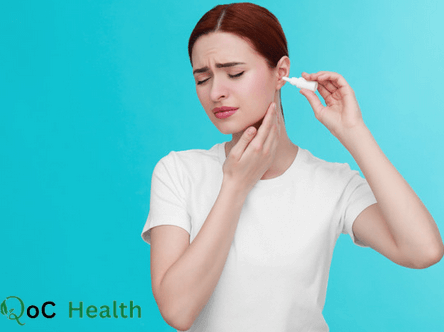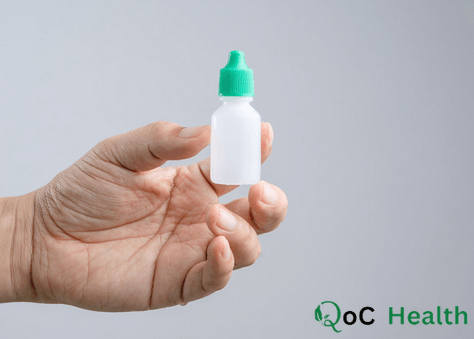Prescription or over-the-counter ear drops typically don’t work for the majority of people who experience tinnitus or ringing in the ears. The main cause is irreversible damage to inner ear structures, which accounts for around 90% of cases of tinnitus.
This kind of injury frequently affects the cochlea’s sensitive hair cells, which aid in the brain’s reception of sound. Treatments using ear drops do not address the underlying cause of tinnitus, which is usually neurological or circulatory problems inside these inner ear components, and so do not relieve the continuous ringing or noise.
What Are Ear Drops?
Liquid medications called ear drops are inserted into the ear. While some ear drops require a prescription from a physician, others can be purchased over the counter.
It’s crucial to consult a physician before using ear drops. Additionally, you should avoid using them at all if you think you may have an eardrum rupture. Ear pain, hearing loss, ear ringing, fluid leaking from the ear, and lightheadedness are all indicators of an injured eardrum.
Why and When Would Someone Need to Use Eardrops?

Ear drops are medications you place in your ear to help with ear problems, such as swimmer’s ear, middle ear infections, and blocked earwax. Some ear drops are available without a prescription, while others need one from a doctor.
You might need to use ear drops if you have any of the following ear issues:
- Inner ear infection (also known as otitis media).
- Outer ear infection, or swimmer’s ear (otitis externa).
- Ear pain.
- Earwax buildup causing a blockage.
- Itchy ears, which could be with or without eczema.
- Fluid draining from the ear.
- A feeling of fullness in the ear.
Related: Can Tinnitus Be Cured Naturally?
Is There Any Real Relief for Tinnitus?
You have tinnitus when you hear sounds that are unique to you and not produced by anything outside of yourself. Though it might sound roaring or buzzing, it is frequently described as a ringing noise. Ten to twenty-five percent of people suffer from tinnitus, and children can also have it. Over time, it might improve or go away, but for some, it might worsen. Tinnitus is classified as chronic if it persists for longer than three months.
Although its precise causes are unknown, tinnitus frequently coexists with hearing loss. Although tinnitus usually doesn’t interfere too much with day-to-day activities and isn’t associated with any major health problems, it can impact your mood and make it difficult to focus or fall asleep. In extreme circumstances, anxiety or depression may result.
Although tinnitus cannot be cured 1, some therapies can help manage the symptoms. These
Different Types of Ear Drops for Tinnitus
Ear drops are available in multiple varieties. Which one is best for you will depend on several factors, such as the nature of your ear issue and your symptoms.
Antifungal and Antibiotic Ear Drops
If you have an ear infection, your doctor might recommend using antifungal or antibiotic ear drops. The active ingredients in these ear drops often include:
- Gentamicin
- Miconazole
- Fluconazole
- Acetic acid
- Aluminum acetate
- Clotrimazole
- Ofloxacin
- Tobramycin
- Ciprofloxacin
Antibiotic ear drops require a prescription from a healthcare provider and are unavailable over the counter.
However, some antifungal ear drops can be purchased without a prescription. It’s essential to consult your doctor before using these treatments.
Related: Zencortex Reviews Consumer Reports And Complaints Does It For Tinnitus?
Treatment Options for Swimmer’s Ear
Swimmer’s ear is an infection of the outer part of the ear. Bacteria usually cause it, though fungi can also be a culprit. This condition can lead to symptoms like pain, itching, and swelling.
Keeping your ears dry is essential for prevention, so always dry your ears well after swimming or showering.
For treatment, healthcare providers may suggest ear drops containing:
- Alcohol or vinegar
- Cortisporin®
- Acetic acid
- Dexamethasone
- Ciprofloxacin
Over-the-counter ear drops that help dry the ears faster are also available. These usually contain isopropyl alcohol or glycerin. If you notice your symptoms worsening after using these drops, it’s essential to consult your healthcare provider.
Ear Drops for Pain Relief
Common over-the-counter pain medications like ibuprofen and acetaminophen are usually sufficient for treating ear pain. You can also purchase ear drops with homeopathic components for pain alleviation.
These are predicated on the idea that “like cures like,” which postulates that drugs that produce symptoms in healthy people may also alleviate those symptoms in sick people 2.
Typical homeopathic components found in these ear drops consist of:
- Wolfsbane (Aconitum napellus)
- Ferrum phosphoricum
- Belladonna (Atropa belladonna)
It’s wise to consult a healthcare provider before using homeopathic remedies for ear pain.
Options for Earwax Removal Drops
Ear drops are specifically formulated to soften and release buildup of ear wax, so simplifying their removal. There are three types of these ear drops: oil-based, non-water-based, and water-based. In situations where earwax is affected, medical professionals may recommend ear drops that include:
- Glycerin
- Sodium bicarbonate
- Carbamide peroxide
- Hydrogen peroxide
After the drops have worked, you’ll typically rinse your ear canals with warm water. Many products include an ear syringe to help with this process. Always follow the instructions provided with the product.
It’s essential to consult your healthcare provider before using any earwax removal drops.
Treating Itchy Ears with Ear Drops
If your ears are itchy but not infected, corticosteroid ear drops can help soothe the itchiness 3. However, if an infection is present, you might need ear drops that include antifungal or antibiotic agents and corticosteroids.
Common corticosteroid ingredients in these ear drops are:
- Hydrocortisone
- Fluocinolone
- Dexamethasone
Remember, ear drops for itchy ears require a prescription from a healthcare provider.
Some Advantages and Disadvantages of Using Ear Drops for Tinnitus
Advantages:
- Quick action: Ear drops have a faster antimicrobial and fungal elimination rate than oral drugs. In some circumstances, all three might be required to address the problem.
Disadvantages:
- Side effects: A typical ear drop side effect is a burning or stinging sensation inside the ear canal. It can be painful but normally goes away in a few minutes and is not concerning.
- Risks: Ear drops carry certain hazards, even though serious side effects are uncommon. If you detect any new pain, redness, or swelling around your ears, if your hearing noticeably changes, or if you observe any signs of an allergic response (rash, lightheadedness, difficulty breathing), you should get in touch with your healthcare practitioner.
Ear drops are a quick and efficient treatment for many ear-related problems, but there are dangers and side effects to consider, particularly when using them to treat tinnitus. A healthcare professional should always be consulted before beginning a new treatment. It’s crucial to remember that ear drops don’t actually help the majority of people who experience ringing in their ears.
The Bottom Line
Even though ear drops can’t cure tinnitus, they can help with some symptoms, particularly if caused by an underlying infection. It’s important to remember that ear drops efficiently treat infections rapidly. Still, they are ineffective in treating most cases of tinnitus, which are frequently caused by non-infectious conditions. To be sure ear drops are a good fit for your particular condition, talk to your doctor if you’re thinking about using them to relieve tinnitus.
References
- Johns Hopkins Medicine. “Tinnitus.” Available at: Johns Hopkins Medicine.
- National Institute on Deafness and Other Communication Disorders (NIDCD). “Tinnitus.” Available at: NIDCD.
- Cleveland Clinic. “Ear Drops.” Available at: Cleveland Clinic.
- What Is The Most Successful Treatment For Tinnitus? - April 22, 2024
- Do Ear Drops Work for Tinnitus? - April 16, 2024
- Are Diet Apps Effective? Truth Behind Nutrition Tracking Apps - February 7, 2024
